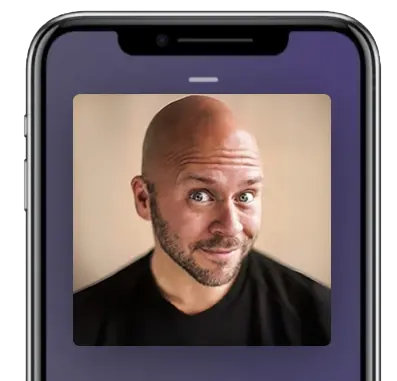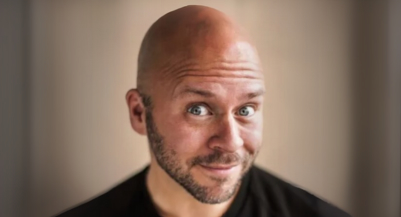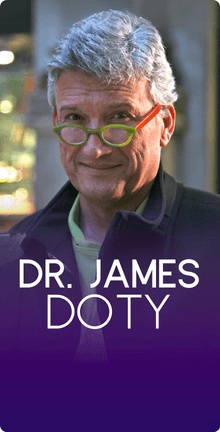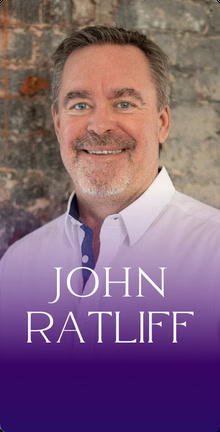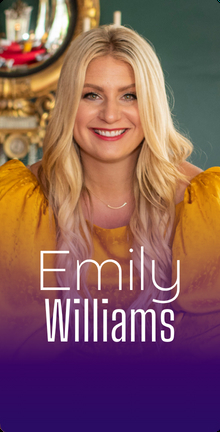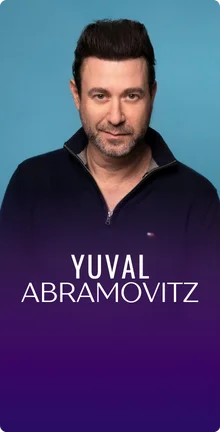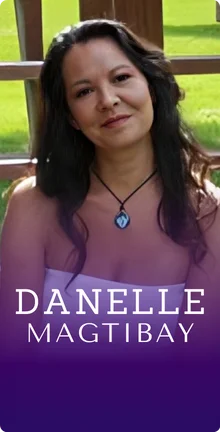In this Episode
- [02:49]Derek Sivers explains that his ideas often come from conversations with talkative friends who encourage him to write down his thoughts.
- [08:36]Derek Sivers shares an example of a memorable email he wrote for CD Baby, which highlighted the importance of human connection over AI-generated content.
- [22:10]Stephan Spencer and Derek Sivers discuss the importance of vulnerability and quirkiness in human connection.
- [28:16]Stephan Spencer and Derek Sivers talk about the need to stand out and be remarkable, rather than blending in with the crowd.
- [35:33]Derek Sivers mentions that his last book, “Useful Not True,” feels like a culmination of his life’s work.
- [44:13]Stephan Spencer recalled how a seemingly drastic moment created the Amber Alert.
- [52:14]Stephan Spencer and Derek Sivers discuss the impact of belief on reality.
- [63:25]Derek Sivers shares how the idea of Now Pages started with his own website and has since inspired thousands of others to create similar pages.
Derek, it’s so great to have you on the show.
Thanks, Stephan. I admire what you’re doing, and I’m honored to be here.
I’m honored to have you on. I’ve really enjoyed what you’ve put out there in the world. For example, Hell Yeah or No. That book is on my bookshelf. It’s in storage right now because we’re in transit. I was just having this conversation with my wife yesterday as we were looking at houses.
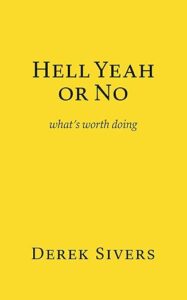
The core of my friendships is curious people with whom we talk about life. “What do you think of this? Why do people do that? What do you think is the underlying motivation behind the reason that people do this thing?”
Just constantly analyzing life. And so in those discussions, when I say something to a friend and they say, “Oh, that’s really good, you should write that down.” I say, “Really? Okay.” If I say some phrase that they say, “That’s really catchy, you should remember that.” I say, “Okay.” That’s where my book titles come from.
What is your process for creating a book? Because a lot of people have a book in them, but they never write it.
My main advice for anyone who feels inspired by what Stephan said, and if you think you have a book inside you, is to start blogging. Take each individual idea and stop thinking of it as a book. Start thinking of the individual ideas that you want to get across to someone else. The main key, then, is to focus on each idea one at a time. Make each idea its own separate article or blog post. If a blog post has two ideas in it, split it apart so that it’s two separate posts.
That way, each idea gets its own spotlight. Each idea gets people’s attention; send it to everybody you know and post it on every account you have. You can start to get feedback on each individual idea, because you’ll never know which idea you have will really reach people in a way. You might have an idea of, say, ‘I don’t know how to get hired,’ but it was point number three out of five that really reaches people.
It’s less likely to become shareable if it’s item three out of five, whereas if you had made that its own separate article, it would really travel better. My main advice to anybody with a book inside of them is to just start a WordPress blog, or, actually, the best one I found lately is Bear Blog.
My main advice for anyone who thinks they have a book inside them is to start blogging.
It’s free, it’s run by one sweet, amazing guy in South Africa, whose work I love so much. I told him that I am happy to be the godfather of his site. If he ever wants to retire or give up, I’ll take it over for free as well. He’s a guy like me who’s just doing it for the right reasons, not for the money. Bear Blog is such a great service. It’s no nonsense. You can just put a blog up and start posting your ideas one at a time.
After you’ve posted your ideas 50 to 80 times, you realize that you’ve already written your book. You can just compile these ideas into a book and share it with the world for the kind of people who prefer to lie on the couch and read a book. That answers both of your questions. What is my process? That’s what I’ve done in the past. That’s what I highly recommend for anybody else.
What do you think about AI as a companion or tool to assist with the writing process, with the ideation process, with the editing and so forth? You could completely write a book with AI. I’m curious where AI sits in your toolkit and in your values as far as utilizing it for your writing.
It’s a beautiful, helpful bag of words to reach into. I think it’s a shame that we call it artificial intelligence because it is not that at all. But it is a wonderful bag of words that we can bounce ideas off of. I love it for that.
We shouldn’t let it write for us for the same reason that people don’t go to a concert to hear a robot make music, and they don’t go to a ballet performance to see robots dance, even though I’m sure Boston Dynamics would like that. They want to see real people doing these things.
AI is a wonderful bag of words that we can bounce ideas off of.
Don’t think that just because one of these bags of words, LLM tools can write a paragraph better than you. Don’t think that’s what people want. You should still challenge yourself to do it for the same reason that you don’t take a taxi to the finish line if you sign up to run a marathon. Having it done is not the point. It’s the doing it yourself. You want to explore yourself through your writing, not just press a button and have it done.
I think also that your inspiration, your divine kind of connection, is present in all your creative works, even if it’s in an email. You wrote an email, I don’t know, decades ago for CD Baby that Joe Polish—I’m in Genius Network, I’ve been in since 2018—still talks about.
This is the gold standard in writing an email that makes people feel something. And you want to share a little bit about that campaign. It’s basically the polishing of the CD and putting it in a special case and walking it on the red carpet with a pillow. I’m paraphrasing, but it’s really special.
Thanks for telling me that Joe still talks about it. That’s really sweet to hear. It was 1998. I had just started my little online record store. And by default, the shopping cart had a default email that said, “Your item has been shipped to the following address. Thank you for your order.”
I looked at that and I thought, ‘I can do better than that.’ Notice there’s a lesson here with the AI stuff since you asked. That’s impersonal. That’s just a robotic announcement. This is just a record store. I should do something fun.
Being remarkable is simple: make something worthy of remark. Share on X
It took me literally 10 minutes, and I whipped up a silly little thing like you just said, “Your CD has been placed onto a satin pillow and our private jet is flying it to you right now in Des Moines, Iowa. Your picture is on our wall as customer of the year. We can’t wait to hear from you again. We’re all exhausted, but what a fun day it’s been shipping your CD on this day, Friday, 19th of July.”
I wrote it in 10 minutes, made it the default shipment notice, and people loved it so much that they forwarded it to all of their friends and thousands of customers came my way just because they heard of me because of this silly email that I wrote in 10 minutes.
The lesson learned is that, yes, an AI could write something more professional than you, but it’s not the professionalism that we love about something. It’s the humanness. It’s the quirkiness. I think any writer now should take it as a challenge to write something that an AI would not write.
We can do better than that. They’re creating the average because they have digested the average of all of the words on the internet. They’re able to generate a perfectly fine average. But you can do better than that. You can make yourself weirder or more vulnerable than that.
The reason I liked the artist Sheryl Crow back in the days of All I Wanna Do and the song Leaving Las Vegas. I heard it once on the radio in the background while I was at a restaurant with a friend. At one point in the song Leaving Las Vegas, her voice cracks. I just did a double-take, and I looked at the speakers like, “What? Her voice just cracked, and she left that in. That was so charming! Who is this artist? I’ve never heard of her before. Sheryl what?”
“Sheryl Crow.”
“Okay, how do you spell that?”
I looked her up because I wanted to know who that artist was who left the crack in her voice on that high note. Because it was so vulnerable and so human. Whereas somebody else might have evened it out with autotune and made it perfect—same thing with our writing. If we leave in these vulnerable human bits and say things that an AI would never say, I think people really connect with that so much more.
I actually see a connection between the Hell Yeah or No. This concept of being vulnerable and putting your personality into things. If you are going to use AI for, let’s say, a sales email or a customer service response, then that’s not a ‘hell yeah.’ That’s just me, too. I’m like everybody else. I’m doing the same old, same old. This is just par for the course.
I love Seth Godin’s definition of “remarkable”. And it’s just so simple. It’s worthy of remark. If we’re worthy of remark and our content is worthy of remark, then we will be remarkable and we’ll create remarkability in our experiences. Whether it’s as a family member, a business owner or a cog in a wheel somewhere deep in the large corporate enterprise.
I thought of two more fun examples for this. There is a tech writer named Steve Yegge. He has a funny, verbose style where all of his writings are rants. They would usually begin with something like, “All right, I’ll admit, I’m two beers in and the kids have gone to bed, and I’m still angry about this thing in the Python programming language show. I’m just gonna rant until my wife tells me to turn off the light.” That’s how his rants would begin.
They were so charming because they would give you this picture of somebody who just has something that’s so burning to say that he’s just gonna paint the picture for you. “My wife’s scowling at me right now, but I just have to get this off my chest.” What a great way to begin. Somebody who’s burning with something to say. I love these vulnerability moments of wonderful humanness that, whether it’s a hell yeah, or just really connect to our humanness in a way that computers won’t do.
How do you reconcile that with the need to get straight to the point and lead with a hook and then foreshadow to the payoff at the end and keep them on this crazy wild ride for the full minute and a half or whatever that you have in your short or your reel? And then you end abruptly so that they want to watch it again because they feel incomplete.
When everybody starts doing the same thing, it feels so worthless. The game is to stand out, not to fit in. Don’t do what everybody else is doing. Find the song that hasn’t been written yet. Share on X
It feels so engineered just to hijack their dopamine reflexes or their neurological pathways to keep them hooked to watch more and more of your viral content. I’m using air quotes here if you’re listening. That is just so antithetical to what you just described. I’m just on a rant because I’m really pissed off about X, Y, and Z. Like, they’re already gone. You just blew your first three seconds; they’ve already swiped. How do you reconcile all that?
I’m not trying to please the algorithm. But you could make the comparison that what you’re describing is like a perfectly engineered Hollywood blockbuster. This Marvel superhero movie hits the three-point story action line, or I don’t even remember what those screenwriting tricks are.
But we’ve grown numb to having the perfectly engineered story delivered to us with the perfect ending that got the crowd ratings by the Marvel Hollywood research groups. When a movie comes out that blows those expectations, it ends up doing surprisingly well when suddenly the hero or the one we thought was a hero, gets killed at the beginning. You go, ‘What? Wait, what? Huh?’ That just threw me off. That’s what some people love about foreign films. They often defy the Hollywood expectation. But even if it’s a Hollywood film from a bold filmmaker or screenwriter that does something radically different, it gets the attention of those of us who’ve grown numb to the formulaic stuff, doesn’t it?
One movie I didn’t particularly enjoy, but I’m going to use as an example because it defied all the standards at the time, was The Blair Witch Project. I’m not recommending that movie. It’s disturbing. It really stood out. It defied logic. It defied the standards of the day.
I think it probably started a genre of somewhat hyper-realistic, do-it-yourself kind of movies. I think that’s probably even a genre now because of them. I think being different just for the sake of being different isn’t the answer here, but it is to share your light, for lack of a better term.
I think of it in musical terms, of what song hasn’t been written. If you’re just going to be making a song that’s exactly like every other song, there’s really no point for it to exist. We could just listen to the other song that’s already done. You try to find something in yourself that’s never been said that way, or never been sung that way or a beat that’s never been put together that way.
Then you’ve created something unique in the world. Don’t do what everybody else is doing. If you look at my book covers, I overthought the process of what I wanted my book covers to be, because I knew I had five books in me that were going to be coming out over five years. I wanted them to have a common theme. I spent approximately nine months working with ten different designers to create the ultimate book cover design.
Yes, an AI could write something more professional than you, but it’s not the professionalism that we love about something. It’s the humanness. It’s the quirkiness.
In the end, I didn’t like any of them. Just wasn’t right. I visited a friend’s house that had some old library books, like those from the 1930s, where the covers might have had an outside dust jacket, but now all that was left was the plain, solid-colored linen hardcover book, simply labeled with the book title and the author’s name.
I looked at that and went, “Damn, that is so cool. That is so badass. It’s so confident.” It doesn’t need to ‘wow’ you with the pizzazz of its graphics on the cover. Just the title and the author’s name should be enough to intrigue you.
I felt that there was something there that would be my unique contribution to the current world of book design covers. I have these non-cover covers where I decided to make them linen hardcovers like a library book without the dust jacket. There is no artwork on the front. It’s just the title and the author. I’m so proud of them. They make me so happy.
I beam with happiness when I see my linen hardcovers like that. I thought it was such a confident choice that added something different to a crowded market.
Now that you mention it, it is one of the few covers that come to mind that I can remember. I don’t really remember many book covers, even for great books that I’ve really enjoyed and recommend to many people, like The Alchemist or whatever. It’s hard to remember what that book cover looks like. Super easy to remember yours.
I think I don’t do YouTube videos, but if I did, I would certainly not be doing the ‘O face’ on the thumbnail. I don’t care if that drives more viewers. It’s just the wrong thing to add to the world to do the exact same thing as everybody else. And honestly, I’m really impressed that in the video version of your podcast, you’re not sitting in front of a bookshelf right now. I really appreciate that. When everybody starts doing the same thing, it feels so worthless.
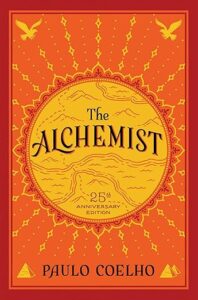
With AI creating music and it’s so easy with the prompt to use a tool like Suno, how do you continue to stand out when it sounds so good already? It’s weird. Have you tried Suno or any kind of AI music platform like that?
I haven’t, but I’ve been around long enough that I recognize that this was a similar conversation that came up when synthesizers first came out, and now somebody with no skill could just literally press one button and hold their finger down on it. It would give a beautiful string orchestra or a great drum beat with no skill.
Then Photoshop came out, and a lot of these same conversations were being had then. What does this mean? Photoshop can make any photo look good. Eventually, it still comes back to doing the things that the computer can’t do and reaching people on a human emotional level, not just polish.
Being authentic and vulnerable, and using auto-tune, exists, and some people use it in a very distinctive and unusual way. That’s cool. But if you try to fake people out, then you don’t look authentic.
Even if you don’t initially get caught out, don’t have a mess up with the lip syncing or something, and it’s still, you don’t have that presence, the same presence that you would have with that confidence of, ‘I’m putting myself out there, the real me.’
I know you’re recording this in New Zealand. I’m curious about New Zealand. For one, I’m very passionate about New Zealand. I lived there for seven and a half years. For the first four years, I was in the North Shore and Hibiscus Coast area of the North Island above Auckland.
I moved to the second half of the Christchurch area. I was in Kashmir, I was in Corsair Bay, and it was magical. I love New Zealand. I’m not there anymore, obviously. Now, I’m in Israel in the Holy Land, and that’s a whole different sort of thing. I love it here too.
If we leave in the vulnerable human bits in our writing and say things that an AI would never say, people could connect so much more.
I’m curious, for me, New Zealand was an inspiration. Before I had my spiritual awakening, I was agnostic, and I didn’t believe in all that sort of stuff. But something came in that was so strong, like New Zealand. I had no idea where it came from or why, but I followed that intuition, and I applied for permanent residency, which I was granted. I’d never been there. I convinced my wife at the time and my kids that this would be a good move.
When everyone was moving from, I was in Madison, Wisconsin, at the time. Everyone was moving from places like that to Silicon Valley or San Francisco so they could build up their internet company. I had an internet company and an agency.
I went totally the other direction. This was 1999, and we went to New Zealand; it was absolutely incredible, wonderful, and life-changing. So I’m curious about the New Zealand thing for you.
Well, it still hasn’t changed much. By the way, do you still have permanent residency?
It’s permanent. I could go back anytime. But the thing is, that was a chapter in my life. And my wife, Orion, whom we’ve been married to since 2016, doesn’t have that pull to New Zealand. We’re here in Israel. This is where she’s from. I love the Holy Land. I love the connection here and everything. This is now our home, but I still have a special place.
Jerusalem, or Tel Aviv or where?
Ramadgan, which is a suburb of Tel Aviv. That’s where she’s from. It was my first wife whom I had to convince to move to New Zealand. However, my current wife, Orion, whom I’m married to now and for the rest of my life, is not interested in reactivating the permanent residency that I have. Which is totally fine, because I feel complete.

That was an incredible chapter in my life, and I love it, and I wouldn’t change a thing about it. Now, I’m here in the Holy Land, so it’s all good.
Let’s connect this to the previous subject. We could all move to Austin or San Francisco and do exactly what everybody else is doing in the search for trying to recreate someone else’s recipe exactly.
“Let me do exactly what this top-viewed YouTuber is doing. Let’s do exactly what the top podcaster is doing.”
But that’s a recipe for sameness. I think it’s so much more interesting to pursue a different angle. Think of the different view on life you get from living in Israel, which, by the way, I love that place. I spent 10 days there in September 2023, just meeting with people. I sat down and met with 20 or 30 people in 10 days.
I was staying just outside of Jaffa, and I got to eat Abu Hassan’s hummus. Do you know that one? It’s the best hummus ever. I had it for breakfast every morning. It’s part of why I was staying next to Jaffa, so that I could have that for breakfast every morning.
Did you make it to Jerusalem?
I didn’t, I wanted to, but there were so many people I wanted to meet in Tel Aviv this time. I’ll come back in a few months and go to Jerusalem. However, on October 7th, something happened, and I haven’t been back yet. But I really want to, I really love my Israeli friends and the special place. I adore it.
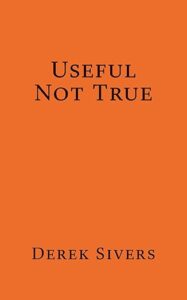
There’s actually a chapter in my new book called Useful Not True, there’s a chapter about Jerusalem and my thoughts on it. Connecting this back to what we were saying before, when I was living in Singapore and my boy was born, I wanted to move somewhere where I could give my son my full attention because Singapore, to me, was a hyper-social place. I had hundreds of acquaintances and friends in Singapore, and everybody knew I was there.
Everybody passing through Singapore wanted to meet with me, which is wonderful. I met some amazing people, but my boy was born, and I just wanted to say no to the whole world and yes to only him. I thought, ‘Where on earth would be a great place to give my kid my full attention for his childhood?’ And I chose New Zealand, even though I had no previous connection to it. I felt that it was probably the best place on earth to raise a baby. It has been. He’s a total nature boy. He grew up here entirely. We moved here when he was nine months old. Now he’s 13. And total nature boy. It’s been a great place to raise a kid. I really just moved here for him.
That’s wonderful. When you have an exit like you had, and you end up with what some people term F-U money, I don’t really like that term, but I don’t have any other alternative at the moment to use, so we’ll kind of use that. That allows you to live anywhere and so forth. And I remember people telling me that in New Zealand, or you’re moving to New Zealand, like, “What are you thinking?” Some would say that, and others would say, “Wow, I wish I could do that.” And I think, ‘why? Why can’t you do that?’
Anyone can. It’s just opening your mind. I forgot to mention that I was a little concerned because I wasn’t feeling done in my career yet. And speaking to a friend in Singapore about considering moving to New Zealand, he said, “Wow, New Zealand, man, everybody wishes they could live in New Zealand. So if you were doing what you’re doing as a writer, speaker, thinker, author kind of guy, but from New Zealand, man, that would probably be a little bit of a career boost to you. It makes you a little more enigmatic, a little more enviable.”
And I went, “Wow, never thought about it that way, but I get that.” Instead of thinking of moving to Israel or New Zealand or Peru as something that would mean you’ve dropped out of the game, it could end up being your competitive advantage. You’d be the only philosophical author in Peru or the only SEO optimization guy in Mauritius. Something like that could give you an interesting angle on life.
That’s true. It ties back into what we were saying earlier about being remarkable.
The game is to stand out, not to fit in.
Yes, and to take up space in the world. Do not be afraid to ‘polarize’, because if you are not ‘polarizing’, you’re not standing in your truth. And you’re not taking up space in the world. You’re hiding.
Don’t do what everybody else is doing.
Something that’s changed in my writing in the past year or two is that I started saying the things I used to be afraid to say. I was afraid to talk about my old divorce. I was afraid to talk about how I renounced my U.S. citizenship. I was afraid that a lot of patriots would hate me forever. I noticed that when I very gently mentioned these subjects, people didn’t seem to care that much. I just decided to boldly start talking about these things that nobody else talks about. I get more thanks from readers in my email inbox for these things that I was bold enough to say, because a lot of people feel that they’re also keeping that hidden inside.
An example is saying, “I don’t love my family.” Not my existing boy, but like, my parents and I were born, like I don’t love them, they’re fine, I don’t hate them, but I don’t love them. And nobody says that. I’ve decided to include that on my About page. And I got more feedback and emails thanking me from that one section of the page than anything else I wrote there, ‘from so many people saying, “My God, thank you for saying this.” I feel so bad for feeling the same way, but it always felt like I was the only one, and to see you just put that out there publicly is so redeeming, satisfying. Thank you.’
There’s stuff that, under the surface, people who have this Instagram-worthy lifestyle actually go through a lot of pain and suffering and difficulty. That’s not what they put out there. I’ve put some of this stuff out there. Like, for example, I’ve had episodes where I’ve spoken about the fact that one of my three grown daughters doesn’t speak to me or my wife or my son, my little one, and actually has never been in his life by her choice. It’s painful, but it is what it is. Everything ultimately is a blessing, as far as I believe it. I’m not blaming her or directing any negative energy towards her. I still love her. I still want the best for her, but we haven’t spoken for years, and it is what it is. I think you have to be real, and it’s not airing dirty laundry. It’s just being truly human so that people can feel like they can relate to you.
It’s often the stuff that isn’t usually said that needs to be said. More people need to hear it.
When I interviewed Sheila Gillette, who’s a famous psychic, and we talked about the fact that one of my daughters doesn’t speak to me. I got a number of comments on YouTube and other communications people saying, “You know, I don’t have this family member in my life. I don’t have a child in my life either that chose to cut me out or whatever. I’m sorry for your loss; it is a loss.” And I’m also feeling a little bit more healed because of your episode that I watched. Where does it stand with your parents now? Are they still alive? Do you feel like there’s anything more to do, or is it all complete?

It’s fine. I feel about my parents the same way that I feel about my grade school teachers. They did a fine job doing what they needed to do at that time. All is well.
That’s the thing, like people do what they’re going to do based on the tools and their belief systems that they have at the time. And if you had the exact same belief system and history and context and wiring that they had, you probably would do the same thing because that’s the nature of being kind of on autopilot. What has been an example of this being turned into a blessing for you, and perhaps for your readers or your tribe?
I am thankful that I feel untethered to my birthplace, untethered to my country of origin. It has allowed me to go out into the world freely and make new ties and feel connected to Singapore, connected to New Zealand, and connected to Oxford, England. I loved Oxford, England. I would still be living in Oxford, England, if it weren’t for COVID that sent us back to New Zealand. I also love New Zealand, but I must say, I really loved living in Oxford, England. We had just moved there in 2019. What happened in 2020, when we were New Zealand citizens? We used the golden ticket to go back to the COVID-free land of New Zealand. But man, I’ve really made some great connections with people around the world, great friends and loves of my life from India, China and Singapore that I never would have met if I had stronger family ties that kept me close to where I grew up.
What book are you working on now that you are probably keeping some of it close to your chest, but what were you comfortable sharing about what you’re working on right now?
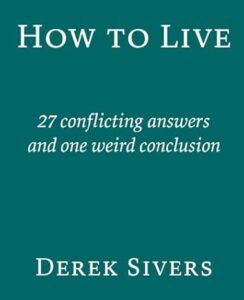
Honestly, those last five books. That’s all I have to say for a while. That last one, especially called Useful Not True, felt like it wrapped up something that was in me that needed to come out. How to Live, the book right before it, really compressed everything I’ve learned in my life into 115 pages, extremely succinct, like poetry, but I just put it out of the world with no explanation.
While writing my newest book, called Useful Not True, I realized it was kind of a prequel to How to Live that explains the mindset that can help people put that into action. I finished writing Useful Not True a year ago. It just came out on Amazon and everywhere else a month or two ago. And I have nothing else in the works.
I’m spending a lot of time learning Chinese and a lot of time being with my boy, who is a teenager now and wants a lot of my attention.
That’s great. Well, at that age, a lot of teenagers don’t want their parents’ attention, so it’s a real gift.
We’re really close. It’s really sweet. We’re setting up a new home that he and I have both designed together in the forest by a creek, half an hour north of New Zealand, off-grid. It’s been a wonderful experiment to build our own home like that. That’s what we’ve been spending a lot of time doing.
That’s cool. So what’s your favorite of your five books and why?
How to Live feels like such a masterpiece for me that if I did nothing else with my whole life but write that one book, it still feels like it would have been a life well lived.
Someone who hasn’t read the book and is listening to this or watching this, what would you tell them as the main point or the biggest wisdom nugget in just a minute or two?
First, you have to know that my books are very short. All of my books are around 100 pages. They’re meant to be something you can read in an hour. But How to Live is 27 tiny little chapters.
The subtitle of the book is 27 Conflicting Answers and One Weird Conclusion. The word ‘conflicting’ is key there. That every chapter thinks it has the answer to the meaning of life. “This is it. This is how you should live. This is what you should value; this is how you should be.”
The very next chapter disagrees with it. “No, no, no, no, no. Here’s how to live. This is it. This is what you should value. This is what you should do.” The next chapter disagrees with the rest. That goes on 27 times, which then can really scramble your system, making you question your own sense of having the answer and making you question all of the other books and pundits that claim to have the answer. It puts it all into perspective. The book finishes with a picture of an orchestra seating chart with exactly 27 instruments in the orchestra, no coincidence, suggesting that you can play the different philosophies of life, the different approaches to life, the way that a conductor or a composer can play an orchestra.
Do you believe that one of the precepts in the Alchemist is Maktoub, which is Arabic for it is written? Do you believe that your life was already written out? Is the screenplay, the script, already a finished piece of work?
I just decided to start talking about things that nobody else talks about boldly. I receive more thanks from readers in my email inbox for these things because many people feel that they’re also keeping that hidden inside.
That perspective can be useful for things that are out of your control, like other people. I think of all philosophies, all approaches to life or ways of looking at the world as never necessarily true, but a point of view that can be useful to you or not. It can be helpful or hurtful. It can bring you peace or bring you anguish. It can improve your actions or hurt your actions. This is how we should measure it. So if the idea that it is all written brings you tranquility or somehow improves your actions, then that perspective is useful to you. And if it doesn’t, then it’s not. I think this is a better measure than debating or arguing whether that point of view is absolutely objectively, empirically, or observably true for everyone everywhere always. But that’s not the point. The real point is, is it useful for you?
Do you find it useful and true for you that this idea that your parents chose you and you chose them before you guys all incarnated?
No. I’ve thought about it a lot. I’ve considered it. But I didn’t find the tranquility or wisdom or love or connection that that idea was meant to bring.
And why? There’s something that I don’t remember where I heard it, but it’s bandied about in New Age circles at least, that if this concept fits, if it works for you, great. If not, just discard it. I think that’s true in this case for you.
It’s also about using time. That’s the other reason for the orchestra metaphor. There are times when the composer wants all the trumpets there. There are times when the trumpets should stop, and a single flute should play for a while. Maybe a clarinet joins the flute. It’s the same thing with philosophies. The approach is that everything is written. Looking at life through that lens might be just what you need next year. But not this year. Right now, you might need to believe the opposite. That if it’s gonna happen, it’s up to me. Nothing’s gonna happen unless I make it happen. My intervention is needed in a severe way right now. It’s all up to me. I’m making it happen, or it won’t happen.
That might be the point of view you need right now. Next year, or in 10 years, or 10 years ago, the idea that whatever’s going to happen is already written, toss your hands up, it’s not up to me. That can be an extremely beautiful and useful point of view at some points in your life. It doesn’t have to be at all points in your life. And the same thing with the opposite. Hence, the How to Live book that some of those chapters says, “Here’s how to live, live for the future.” And another chapter says,” No, here’s how to live, live for the past.” And another chapter says, “No, no, here’s how to live, optimize for money. Money is just a neutral indicator of value. If you want to be useful to the world, use money as a measure that you’re being useful.” Something else, another chapter says, “No, no, here’s how to live, do nothing, let it all pass. And each of these instruments can be played by you when you need them.”
I have the book. I haven’t read it yet. So that definitely inspires me to read it.

It’s only an hour. You’ll find an hour.
That’s true. I just have to find it in my storage unit.
Right, where are you moving to?
We’re staying in Israel, but we’re in between houses right now. Yeah, within an hour.
Okay, it’s all within an hour. My Israeli friends love living there. A few of them have moved from America, and they say the families here are so much tighter because grandma or auntie is always just an hour away at most. Everybody’s right here. Love it.
It’s cultural too. It’s not just because everybody’s nearby. I met the lady who was the inspiration for the Amber Alert, and she had made a trip to, she’s elderly, and my friend’s, it’s my friend’s mother. She made a trip to Israel, and when she was there, a kid got lost. Everyone galvanized the whole crowd of people, all were looking for this little kid. They did find the kid, but it was so striking to her that it was like one big family. Even though these people didn’t know each other, it was just a seemingly random crowd. They all galvanized to find that kid within minutes.
And she’s like, “We need that in America.” She was telling somebody in Israel, like, ‘this needs to happen in America. Why is it not happening in America?’ The friend or the acquaintance said, “It’ll never happen in America because you guys aren’t wired that way.” You don’t have that sense, that cohesiveness and that sense of community that we have, and you never will. And she’s like, “I’m going to find a way to replicate this.” So she went on a mission to try to create something, and it became the Amber Alert.
Any writer should take it as a challenge to write something an AI would never write. Share on X
Thanks for that. I had no idea it originated there. That’s really cool to hear. I particularly love Jerusalem. I like Tel Aviv, but I love Jerusalem. Tel Aviv is where my friends are, but when I go to Jerusalem, it’s just such a special place. I really want to live there someday.
There’s a special area. It’s near King David’s tomb, and there’s a wall there. It’s very nondescript. It’s actually a portal, like a thin place between this world and the upper world. I’ve had experiences there, and family members have gone there and had experiences there. It feels really kind of otherworldly in a very positive way.
Like you’re peering into some sort of dark energy or anything like that. No, it feels very heavenly. If you make it back to Jerusalem, I’ll tell you exactly where that spot is. So one name that popped into my mind that I wanted to ask you about when we were talking about how to live, and that’s Marcus Aurelius. I’m curious what your take is on him and his wisdom.
I don’t have much to say. I read meditations. I liked it. But I don’t think of it that much. Sorry, that’s all I have to say.
We all stand on the shoulders of giants, and I think he, too, stood on the shoulders of giants. One story is just a trivial thing, but it was impactful in his life and actually in a lot of people’s lives. He had a really good friend, a Jewish rabbi, a very wise rabbi. That was seemingly unheard of, right? But he kind of kept it under wraps because it wouldn’t have gone over well. So this rabbi, Rabbi Judah ha-Nasi, Judah the Prince, would send kind of secret messages to each other if it wasn’t appropriate for them to meet in person or anything.
He sent his soldiers or representative to get some advice from this rabbi one time, because the coffers were running empty and he didn’t know what to do. Like you’re running out of cash, you’d better do something. And the cryptic message that came back, the rabbi said nothing. But as the people who were sent there by Marcus were watching this guy, he was doing some strange stuff in the garden. He was pulling out some perfectly good plants and replacing them with other plants.
When they went back to the emperor and explained that he didn’t actually give a message, no response, like, ‘I need to figure out what to do here about this issue.’ And then he’s like, “What did he do?” He didn’t just sit there or stand there. Well, he was doing, he was gardening, and he took this stuff out of the garden, and he put the other ones back in. It’s like, ‘okay, I know what to do now.’ So in his inner circle, he figured out that he needed to replace, I don’t know, three of them or whatever.
He didn’t feel right about them or something. Then he knew people in, and then the coffers started filling up again. They were stealing from the treasury, and he was able to replace them. It’s like you might see something in meditations that actually has Jewish origins because it was ancient wisdom that was just passed on to that particular rabbi, Rabbi Yehuda Hanasi, and then it made it into his little journal, which he never meant to publish. It was a private journal for him.
It makes me wonder whether the plants were a very savvy message that he had a lot of insight into the management team of Marcus Aurelius, and who might have been stealing. Or if it was Marcus Aurelius who brilliantly interpreted this otherwise neutral action.
It wasn’t neutral. It was very precise. Because there are so many other stories of Rabbi Yehuda Hanasi and other sages from the past. There’s one story I love about the Baal Shem Tov from hundreds of years ago, where he was at this very holy time when you’re sitting at the Shabbat table on Friday night, and the prayers, the singing, the eating, it’s all very intentional. It was very quiet, and they’re eating, and he’s with a bunch of his students. Then he just erupts into laughter in the middle of it, which is very strange. They didn’t ask about it because it wouldn’t be appropriate. They waited for Shabbat to finish, and then they did ask.
He’s telling them that something happened in the heavens that was really magical and adorable. He was able to see it because he had that special kind of sight. And he’s like, we’re making a trip, going to this town far away. We’re going to see about that event. They didn’t know. He didn’t give a lot of details, but they showed up at this shoemaker’s door hours and hours away and knocked in the middle of the night or something like that. The guy opened the door, and he’s like, “Wow, this is the Baal Shem Tov,” like one of the most famous Jews in the world at the time. And come on in, and it’s like, “Why are you here?” Like, “I’m just a shoemaker.” He’s like, “What happened on Friday night?” It’s like, “What do you mean, Friday night? What happened? Something happened. Tell me about it.”
It’s like, well, you know, we’re very poor. Usually, when I come back from the synagogue, there’s really no food for us to eat. Maybe you’re supposed to have a kind of celebratory meal. I didn’t have any expectations that we’d have anything, even bread, because we’re so poor. But the table was all set. I didn’t get angry thinking that my wife took charity, begged for the money or anything. I just started to come in and not be reactive.
I’m totally paraphrasing this, but basically what happened was the wife told the husband, the shoemaker, that she found a glove with a gold button on it. She was able to sell the gold and buy enough food for a really nice Shabbat dinner, and was so joyful. He was dancing around the table over and over again, just like the most joyous thing. Like he just won the lottery or something, and all the angels noticed and everything. It was a really beautiful thing. Baal Shem Tov noticed the celebration that was happening in the heavens.
I love that. There’s a tiny story in my newest book called Useful Not True about a prisoner in a jail who’s told, Alcatraz, nobody’s ever escaped from this prison, ever, you’ll never escape. He has this hopeless approach versus telling a prisoner, there’s a trap door in here somewhere. Just by telling somebody that there is a trap door in here somewhere, it makes them look at everything differently. Suddenly, every little brick is a potential exit. I think about this with this idea of messages coming through that if you tell somebody there are messages, or this has a meaning, or look at this photo or look at this world in front of you. It has messages for you. They’ll find them if they’re expecting them, and they might not find them if they’re not.
One thing that is kind of a corollary to that is if you get messages, like intuitive hits or whatever, and you don’t act on them, then you’ll stop getting them because that’s disrespectful, like you got a gift from above. I remember my number two guy in the company here was sharing in a team meeting that he was driving, his wife was in the car, his son was in the back seat, and his wife says, “Get in the right lane.” Which was weird, just out of the blue, get in the right lane. She repeats herself, “Get in the right lane.” And he still doesn’t do it. Then she yells at him, “Get in the right lane.” And guess what happens just a second after he got over into the right lane, a crash in the left lane. You have to take those messages and do something with them because it’s disrespectful otherwise.
That’s what I love about your show, and what you’re doing is helping people notice these things around them, calling their attention to this. In a way, you are the one saying, in the right lane. Sorry, that’s a bad comparison, but maybe look around or listen to those messages. Look for them, listen to them.
Another way to think about it is to show up and say, “I’ll go first.” I was at the Genius Network annual event years ago, and sat next to an elderly gentleman whom I didn’t really know. This was at breakfast on one of the days. I struck up a conversation. I share some of my crazy stories with him. He’s like, “I got one for you, too.” I don’t know how often he shared it or if he ever shared it, whatever, but you know I’m anonymizing it.
I don’t remember his name. Still, he was in a grocery store and the guy in front of him, who was checking out, turned to him and said, “Your mom wishes you a happy birthday and she loves you,” and he paid and he left, and guess what, it was that guy’s birthday and his mom had passed. People are not willing to shout these things from the rooftops because they don’t want to be marginalized and considered crazy or charlatans or anything like that. They keep it to themselves unless you go first.
Do you know who Derren Brown is? The British Magician?
I’ve heard of him, but I don’t really know him.
If you look him up on YouTube, he’s got a video, maybe you’d have to search for Darren Brown, Lucky or Luck. He went to a working-class, or let’s just say, a sad kind of factory town in Northern England somewhere, where the economy was not doing great. He and his team pulled around and did some research to find somebody who is self-described lucky and somebody who is self-described unlucky.
Then he hung around this town for a week doing some experiments, hiding little messages, like literally leaving messages on sidewalks, putting signs up in storefronts to the people that were self-described as lucky and self-described as unlucky. You won’t be surprised to hear this, but the person who was self-described as lucky noticed all of these little messages. And the person who was self-described as unlucky not only didn’t notice any of the messages, but also the money left on the street, on the pavement where he was walking.
Eventually, they had to put his sign on a giant advertising truck that drove around in front of wherever he was with his name on it, saying, “Know, Jeffrey, call this phone number. If you just call this number, there’s a reward waiting for you. Just call it.” He didn’t even notice the truck with his name in giant font as high as he is. He was shown the video later, and he was just like, “Oh, well, what can you do? “ He had just called, yeah. But had he called that number, they were going to give him 10,000 pounds or whatever it was.
All he had to do was just call the number, but they put out ads in the paper that he reads every day. They put signs in the shops that he went to every day. He didn’t notice any of them. Granted, these things can be played up for the sake of making entertaining television, but there is a great message that often the difference between lucky and unlucky is just paying attention.
I think belief, right? Was it Henry Ford who said, “You’re either you’re,” or Thomas Edison.
Whether you think you can or you think you can, you’re halfway there.
There you go. Thank you, “Whether you think you can or you think you can’t, you are right.” I love that, know because it’s you make your own reality, you make it true by your belief, and if you believe you’re going to be lucky or you’re going to be unlucky, so be it.
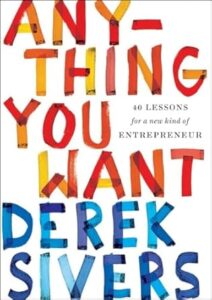
Could that apply to spiritual stuff? Could you say whether you think there’s a heaven or you think there’s not, right? Or whether you think there’s a deeper meaning to life or you think there’s not, you’re right?
I think your belief is setting the parameters of your simulation, but I believe outside of the simulation. So you get this illusion. Some cultures call it Maya, some call it Samsara, or just an illusion. Nothing’s real here, none of this. At least that’s my understanding of it. That’s what I was shown.
Whoa! Please explain, how do you mean?
I have other episodes where I talk about my spiritual awakening and being shown the matrix and all that. But this reality that we live in is not reality; it’s just hyper-realistic. If you set your parameters by programming the simulation to have a very unlucky life because that’s what you believe you deserve, order up. There you go. Your belief and your worthiness and your desire to create or do or be or whatever, all that is already set up. That’s my understanding of it. This is some deep Jewish Kabbalistic wisdom that the fulfillment actually came before the desire. Because you wouldn’t have the desire if you didn’t have the fulfillment, and whether that fulfillment materializes into the physical plane or not is up to you.
If you desire so badly to have a successful business with eight figures in revenue and da da da, nine figures, that’s in your vortex. That’s already fulfilled. It’s just, do you bring that into the physical reality or not? That has to do with faith, that has to do with other kinds of limiting beliefs and things that you might have prevented that from actually materializing, but it’s already been programmed into your simulation. Otherwise, you wouldn’t have the desire for it. Who has a desire for, let’s say, some strange Indian dessert that you’ve never heard of, and you’re just some American guy, right? You don’t, like somebody offers you that dessert and says, ‘Would you like it?’ And I’ve never heard of it, and I’ve never seen it before. Nah, it’s okay. I’ll have the ice cream instead. It’s like, well, that’s because you never received the fulfillment. You never tasted it. and the non-physical, and so you don’t have a desire for it. That’s my understanding of how this universe works.
Love it. Thanks for that.
What’s the wisdom nugget we can leave our listener or viewer with to wrap the show up with a nice bow?
I swear I’m not just trying to sell a book. I don’t care if anybody listening to this ever buys any of my books. But I’ve been thinking of this so much this past year. This idea of useful not being the best judge of anything you hear. Even some of the stories you told today, instead of somebody arguing about whether that is absolutely objectively empirically observably true for everyone everywhere always, you could just ask yourself, ‘Is this useful to me?’ Which puts the agency back onto you, and it presents the question to yourself of ‘what am I going to do about it?’
Even if it means feeling at peace or being prepared to let go of something that was bothering you before. If you hear a story about a rabbi, if you hear a story about messages left for somebody unlucky in a British town, maybe that whole thing was a staged bit of TV. Maybe the rabbi’s story was exaggerated, or it’s a fable. It doesn’t matter. There’s no point arguing whether it was absolutely true or not. Just ask yourself, so what? Meaning, not dismissing it, but so what am I going to do about it? If it’s true, ‘what would I do?’ If it’s false, what would I do? Which of those choices is more useful to me?’ That’s the real question.
A way to think about this, and it’s in a similar vein, and I use this all the time, is that it’s the willing suspension of disbelief.
That’s beautifully crafted. Did you come up with that? That’s really good. That’s almost comic timing. Especially the fact that the word disbelief is the last in the sentence, which completely upends our expectations in a powerful way. That’s really good. I really like that. Hey, you asked how I come up with my ideas. It’s exactly a moment like that. Someone giving you feedback, going, ‘Stephan, that’s good.’ You should use that. Keep that. Write that down. The willing suspension of disbelief. I love that.
Yeah. Yeah, yeah, I forget who said this, I love the expression, that’s a writer downer.
Yeah, you know the song Yesterday by Paul McCartney, when he first came up with it, he could have sworn that somebody else wrote it. He went and asked everybody who wrote this. And everybody said, “I don’t know.” So he said, “Well, I guess I did. So who knows, maybe you just wrote that thing. If you don’t know who came up with it, maybe it was you.”
“What gets measured gets managed.”
You know, one of my favorite useful, not true quotes is, “What gets measured gets managed.” It’s part of a longer quote, and it’s actually misattributed to Peter Drucker. And I forget who actually said it, but it actually kind of goes counter to what you think it would be. But I still love what gets measured gets managed. Wear your aura ring if you actually want to do something with that data and take some actionable insights from the reports that you get, and maybe change some behaviors.
If you just kind of wing it without the data, then I mean, you’re probably relying on something, whether it’s intuition or what, but what gets measured gets managed. Like that quote. All right, so that’s a great wrap-up here.
So if our listener or viewer wants to read your books or learn from you. Even if they just want to look at your, what I’m doing now page, which I love, yeah. Maybe you should just, for 30 seconds, explain what this is. Cause I don’t think I’ve ever seen any other personal website provide that kind of insight into your thinking and your priorities and your passions in the way that you do it.
Thank you. You’ll now see thousands of them. About 10 years ago, I wondered what my friend Benny Lewis was doing. He’s kind of a popular online guy to track down, but he’s somebody I care about.
I would go to his social media and it would show me what he was eating today or an enviable photo from a trip. I thought, ‘No, but in the bigger picture, how are you doing, Benny? What’s going on? There are hundreds of people like me who are wondering how you’re doing.’
Wouldn’t it be really useful to just have a page on your website that says, “Here’s what I’m doing now, here’s what’s going on in my life?” The kind of thing that you would tell a friend you hadn’t seen in a year. For those of us who have a personal website anyway, it’s a really useful page to keep updated so that your random friends and acquaintances that might have met you once at the Genius Network or whatever might be wondering, “Hey, how is Stephan doing?”
That they could just go to a page on your website and read something you wrote last week about, the bigger picture, here’s what’s up. Living outside of Tel Aviv, we’ve already packed up our stuff, we’re moving to a new home, not sure where yet. My podcast is going well; this is what’s up with me. I started doing that in 2015. I put a page on my personal website at Sivers slash Now. Had it there for a couple of months.
A guy named Gregory Brown noticed it and said, “Wow, that’s really cool. I want to have that for my website.” And so he put it up there. I tweeted the fact that somebody else did it. By this time later that day, six more people put it on their personal websites, a slash page to say what they’re doing. And then I emailed my list about it. And now there are thousands and thousands of personal websites that have a now page, it’s called, which is just a page to say what they’re focused on now. It helps you.
Remember your priorities. It helps you point people to that when you have to turn down a project or an invitation. You could say, “Sorry, know, check out my Now page. I’m just really head down and focused on this.” And it can be really great for all of your acquaintances that might just wonder how you’re doing without needing to call you or text you to ask you. I ended up putting all these pages together on nownownow.com. If you browse it, you can see the thousands of people from around the world who have a Now page on their personal website.
That’s cool. I’ll check that out. I was just looking at your server, so it’s I V E dot RS slash now, and I didn’t know you had pet rats, so now I do.
They’re so adorable. I took them on a walk today. I stuck them in my hoodie pockets, and I went on a long walk in the forest for an hour, just rubbing their little bellies the whole time on the walk. Rats are great pets. But to be clear, I hated rats until a year and a half ago when my boy asked if we could get rats as a pet. I thought he was kidding, and he told me he was serious because I hate rats so badly that I killed many rats when I was living in a basement apartment in Boston. And rats were my nemesis, my vicious enemy. Now I love them so much. I cuddle them, I kiss them every day. They’re such sweet pets. They curl into my lap and sleep while I’m working. They’re so sweet.
Now they’re your friends. That’s awesome. I love it. It’s unexpected. It’s kind of the surprise and delight, you know, where people don’t know what to expect. And then you drop a cute, fun thing like that into your Now page that you’re taking them on walks. Yeah, right. What AI would ever think to talk about rats as little hand warmers? I don’t know. Probably only the Derek Sivers clone.
Yeah, set up a Derek Sivers personality at chatgpd.com. Anyway, Stephan, thanks so much for having me.
Thank you, and thank you, listener. Go out there, make the world a better place. I hope you got inspired by this wonderful interview and do something with it. Take some inspired action. We’ll catch you in the next episode. I’m your host, Stephan Spencer, signing off.
Important Links
Connect with Derek Sivers
Books
Businesses/Organizations
Film
People
YouTube Videos


